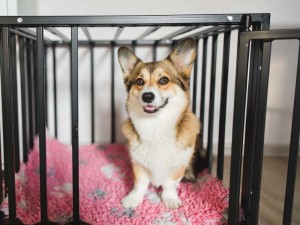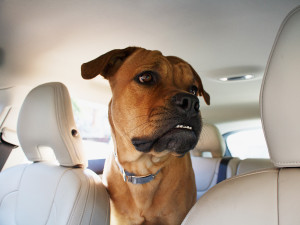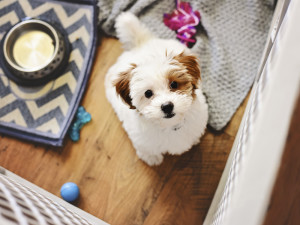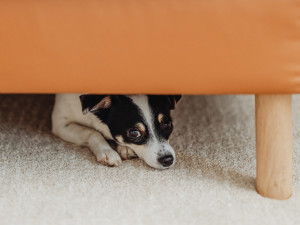How to Keep Your Dog Safe in the Car
Hitting the road with your dog? Make sure they’re safe with this helpful advice
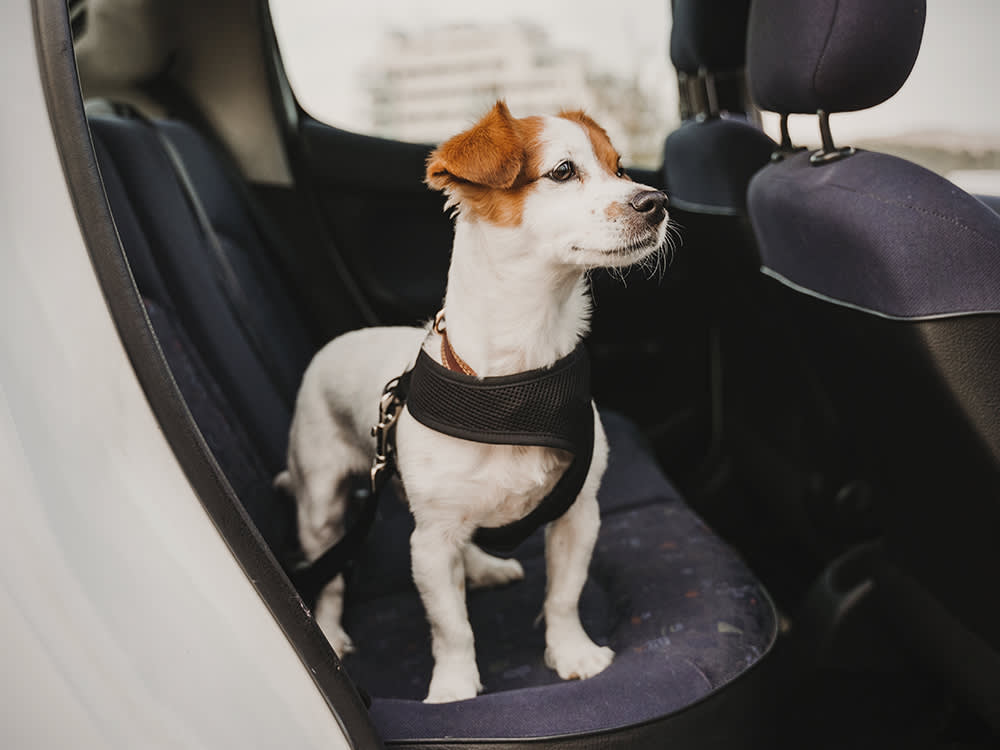
Share Article
Whether you’re going on a long car journey or just running a few errands, bringing your dog along for the ride automatically makes the trip more fun. But when you’re driving with your dog, it’s important to make sure they’re strapped in safely (just like any family member).
However, although the Highway Code actually stipulates that your dog be ‘ suitably restrainedopens in a new tab’ so they cannot distract you when driving, you might be surprised to learn that some of the pet restraints sold to ensure your dog’s safety don’t actually do what they are intended to do – and many are not adequately tested. “Many pet restraint products do not perform well in crash tests, but these products are unregulated because pet products are not considered consumer products. That means that promises on the packaging and in ads are not to be trusted,” says animal behaviourist Karen B London.

littleKin™ is Kinship’s home just for puppy and kitten parents. Bop over to check out expert advice, new pet tools, and special deals—all curated for your newest family member.
opens in a new tabThe non-profit Center for Pet Safetyopens in a new tab in the US was founded to properly testopens in a new tab car restraints for dogs. Very few pet restraints passed the centre’s independent crash certification test, and some styles (including ziplinesopens in a new tab) can be downright dangerous.
What options do you have to keep your dog safe? First, if possible, put your dog in the back passenger seat. The back seat is the safest place for your pup, because crumple zones – which are often likened to crushing a soda can – absorb the impact in the front and cargo areas. This means that in a serious accident, your best bet is to keep your pet restrained in the back seat.
Next, the safest choice is a doggy seat belt or harness (a regular seat belt won’t fit them). With the right dog car harness, you can keep any size dog safely strapped in the back of your car. This should also keep them from distracting you while driving or from hanging their head out the window. Dogs love to feel the breeze through their fur, but it’s actually pretty dangerous – they could be struck by a tree branch or even jump out of the car.
Dog harnesses aren’t your only option, though. Keep reading to learn more ways to secure your dog in the car, plus get six dog car safety tips.
How to keep your dog safe in the car
With the right gear, you can safely hit the road with your dog. Here’s how.
1. Get a dog harness seat belt
The best option to keep your dog safe in the car is a seat belt. Perfect for well-behaved dogs, the harness secures your dog in one position with a strap that plugs into the seat belt. Pro tip: keep an eye on your dog to make sure they don’t chew through the harness mid-journey.
Good for: small and large dogs
How to secure your dog
Slide the car seat belt through the dog seat belt loop and buckle your dog in.
Place your dog on the car seat and connect the silver clasp to your dog’s harness.
Adjust your dog’s seat belt so it’s secure and comfy.
2. Get your dog a plush carry box
Perfect for small, anxious pups, this elevated box gives them a good view of you and their surroundings. Use it in conjunction with a dog harness.
Good for: small dogs
How to secure your dog
Place the plush carry box on the back seat.
Put your dog in the harness and attach it to the carry box.
3. Put your dog in a crate
Great for confident and relaxed dogs, the crateopens in a new tab ensures that your dog is safe, comfortable and secure. Make sure the crate is large enough for your dog to stand up and turn around in.
Good for: small and large dogs
How to secure your dog
Find the right size crate for your dog and car.
Place the crate in the back seat ideally, or in the back of a hatchback-style car.
Cover the crate with a blanket to help your dog relax.
4. Use a dog guard
Ideal for dogs who like to see you and move around, the guard prevents your dog from being thrown forwards in the event of an accident. Make sure to get a guard that bolts to the floor and roof of your car so it can’t be knocked out of position.
Good for: small and large dogs
How to secure your dog
Find a dog guard that will fit your car.
Bolt the guard behind the rear car seats.
Lock the guard to the inside of the roof (follow the instructions provided with your guard).
5. Try a back seat hammock
Perfect for older dogs who may want to lie down, the hammock protects them from falling off the seat and stops them from climbing into the front. Make sure you get one with a non-slip covering so the hammock doesn’t slide off the seat.
Good for: small and large dogs
How to secure your dog
Lay the quilted side on the back seat and insert the anchors between the back and base of the seat.
Attach the fasteners to the rear and front headrests.
6. Install a back seat barrier
Ideal for larger dogs who struggle to relax when restrained, the barrier keeps your dog in the back seat when you brake suddenly. Make sure the barrier is securely attached before hitting the road.
Good for: large dogs
How to secure your dog
Remove the car headrests.
Slide the headrest post through the D-rings and reattach the headrests.
Attach the bottom corners of the barrier to the seat using the hooks or clips provided.
Remember, pet safety products are unregulated with no mandated government safety standards. Some products may be listed as ‘crash-tested’, but the Center for Pet Safety rightly points out, that doesn’t mean they actually passed the test.
6 car-safety tips for driving with your dog
1. Schedule plenty of stops
Let your dog stretch their legs, go to the loo and burn off some energy.
2. Start with shorter journeys
Some dogs get motion sickness so it’s best to slowly build up to longer trips.
3. Don't feed while driving
Instead, feed your dog at least three hours before your trip.
4. Don't let your dog hang out the window
It’s not safe in general, and it’s not good for their eyes. It can dry them out and may also expose them to flying debris.
5. Don’t give them treats on the journey
Dogs have been known to choke while eating on the move.
6. Always have the air conditioning on or the windows cracked
Cars can get very hot for dogs; keep the car well-ventilated.

Daniela Lopez
Daniela Lopez is a digital media specialist and long-time contributor to The Bark.
Related articles
![A cute puppy looking up at the camera]() opens in a new tab
opens in a new tabWhen it Comes to Dog Crates, Think Outside The Literal Box
Dog behaviourist Tiffany Lovell on how to treat and prevent confinement anxiety
![Shepherd dog playing with yellow ball at the beach]() opens in a new tab
opens in a new tabHow to Keep Your Dog Safe At the Beach
Five tips to help your pup have fun in the sun – safely
![Avoid heat stroke in dogs by sprinkling in the backyard with your dog]() opens in a new tab
opens in a new tabHeat–Stroke in Dogs: Signs, Treatment & Prevention Expert Advice
How to take precautions for your pup when temperatures rise
![dog hiding under a couch afraid of noises]() opens in a new tab
opens in a new tabNoise Sensitivity and Pain in Dogs
Research finds why dogs may suddenly become super-sensitive to sounds
